Our new fixer, Moore, fails to live up to his promise of securing flights to Nouakchott in Mauritania today. He takes us to the same travel agent that we visited on Saturday (and the staff categorically deny that Moore is the nephew of the owner). Our quote for the flight is D7,450 pp. Moore says with a straight face and no hint of embarrassment that D6500 is the local price; D7,450 is the tourist price. And much like Lamin before him, Moore seems surprised that we are not happy with his ‘help’. Christi and I had hoped to complete the purchase of airline tickets quickly today so that we could visit the village of Juffureh and James Island on the north shore of the Gambia River. Juffureh has a very famous connection to the slave trade that we wanted to explore. That trip is now in jeopardy. Instead we waste time approaching more travel agents. Moore, our wanna be fixer, will not leave us alone and offers to take us to Juffureh. ‘Take’ proves to mean he will accompany us on the taxi / ferry / taxi rides that will be necessary to reach this remote village. Moore eagerly explains how much the locals would pay the these trips, but that still does not endear him to us.
The next two travel agents quote us fares of D7,500 and D8,000 respectively. Neither of which are acceptable. We trudge despondently back to our hotel unsure how we are going to escape the suffocating grasp of The Gambia. Moore follows us, but at a safe distance until I tell him (none-too-politely either) to leave us alone. We pass one final travel agency and this time we tell the agent that the online fare is D6500 and could they, The Future Travel Agency, match that price. No worries, they say and quote us a fare of D6,250. I am rarely lost for words, but my mouth drops open. This is AMAZING. Of course I now have to obtain sufficient cash to pay for the tickets, which means taking D14,000 out of the Standard Chartered ATM. I try to remain calm, but I’m nervous as hell carrying so much money around in broad daylight. A nerve-racking wait ensues as the agent types a book-full of information into her computer, which is followed by a hollow silence rather than the comforting sound of tickets being printed. ‘We’re waiting for approval from the airline,’ she says unconcerned. Perhaps the airline realizes the fare is wrong and will not proceed with the sale. But no, the printer springs to life and spits out two ONE-WAY tickets to Mauritania. And there can’t be many people in the world who would be so happy with that arrangement, but Christi and I are ecstatic. Huge thanks to The Future Travel Agency for great service at a reasonable price.
It’s now 11am and I still want to visit Juffureh and James Island, but do we have enough time? In the end we go for it. It’s a 20-minute (D175) taxi-ride back to the ferry at Banjul followed by a frustrating 1-hour wait for the boat to unload and reload goods, vehicles and passengers. We pace the dockside like big cats waiting to pounce such is our eagerness (Christi says that is an unrealistic image. Her memory is that sat on a bench reading quite contentedly, while I was jumping up and down with increasing frustration. I like my version better). The ferry ride is 45 minutes, so we arrive in Barra at 1:15 pm. Naively we had believed Moore when he said that a taxi from Barra to Juffureh would take 30 minutes and cost no more D140. The taxi drivers all want D1000 to drive us there, wait while we explore, and then bring us back to the ferry. The negotiations go back and forth with numerous drivers; tempers rise; time passes. We walk away from the ferry to try our luck with a more sympathetic driver. We wake one young guy, Serem, from his lunch-time siesta and he reluctantly agrees to do it for D550.
The ride, in a thoroughly decrepit Ford Fiesta, is a brutal 1-hour slog over rough roads. We pass hundreds of school children, but see no schools and only a few villages. We finally pull into in a dusty, deserted village square located on the banks of the Gambia River. The river is so wide at this point that we cannot see the far shore, only a tiny, forlorn island in the distance. It’s now 3 pm. There are a few other tourists loitering about with the obligatory guide. As soon as we step out of the car guides descend upon us, but we decline their services much to their annoyance. Around the square is the Kunta Kinteh Roots Camp, a statue with broken chains stating ‘Never Again’, a welcome arch, a gun emplacement and a few derelict buildings. A small jetty is home to a few pirogues that make regular trips out to tiny James Island (Note now renamed Kunta Kinteh island). On the island are the ruins of a fort that was used as a holding facility for slaves before they were sent to Ile de Goree or Cape Coast ahead of their onward transport to The Americas. According to the author Alex Haley who wrote the novel, Roots, based on his own family history, this is where is ancestor, Kunta Kinteh, was enslaved.
As usual I’m not willing to meet the asking price of the pirogue captain for a ride out to James / Kunta Kinteh Island, but having already visited Cape Coast and Ile de Goree we have seen plenty of slave cells. What is more interesting is the local slave museum, which depicts yet more horrific details of the evil that man perpetrates on his fellow man. During the voyage to The Americas, the so-called Middle Passage, slaves were crammed together like factory-fed chickens, with no sanitation, little food, and literally suffocating conditions. Twenty percent of the slaves died on the crossing. It is estimated that over a 200-year period 750,000 slaves passed through James Island, 150,000 of which did not survive the Middle Passage.
We’ve saved the best for last. Not only for today, but for The Gambia, and our while disturbing experience with the slave trade. We visit the descendants of Kunta Kinteh who it is believed was captured by Portuguese Slave traders in 1767 at the tender age of 18 and transported to the USA. Oral history within the Kinteh family has kept this memory alive until eventually Alex Haley was able to track down his ancestors and current relatives. It took him many years and several visits to different parts of Africa to eventually find Juffureh in the Gambia. The result was of course the phenomenally successful (if somewhat contentious) book, Roots, which in 1977 also became a TV mini-series. Christi and I meet Mariama Fofana who is an 8th generation descendant of Kunta Kinteh and the matriarch of the Kinteh family. We listen to the Kinteh headman recount the oral history of the Kinteh family, which is both a sad and a magical experience. Christi and Christi and I never planned our Year of Wonder to coincide with the route of the nefarious slave trade between West Africa and The Americas, but from the mines of Potosi to the churches of Ouro Preto, and the slave cells of West Africa we have received a sobering education that we will never forget.
It’s another long journey back to Fajara and we arrive after dark. We eat dinner at the nearby expat hang-out Francisco’s , watching more English football, and then stumble back to our hotel in the dark (there’s negligible street lighting). Along the way I try to hire a taxi that will take us to the airport early tomorrow morning. I shake hands on a deal for D200 (The Future Travel Agents said the fare should be about D150; our hotel had wanted to charge us D500). A word to the wise: our hotel, The Leybato hotel and restaurant, routinely overcharged us for everything – or tried, at least. I’m not sorry to be leaving The Gambia.
Blog post by Roderick Phillips, author of Weary Heart – a gut-wrenching tale of broken hearts and broken test tubes.

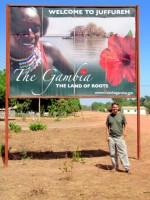
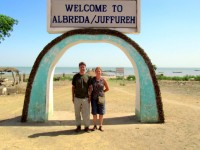
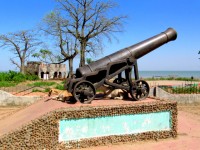
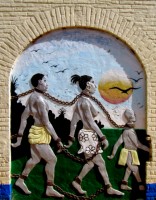
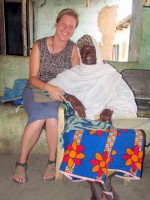
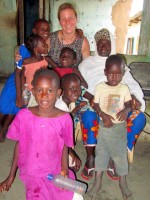
Speak Your Mind